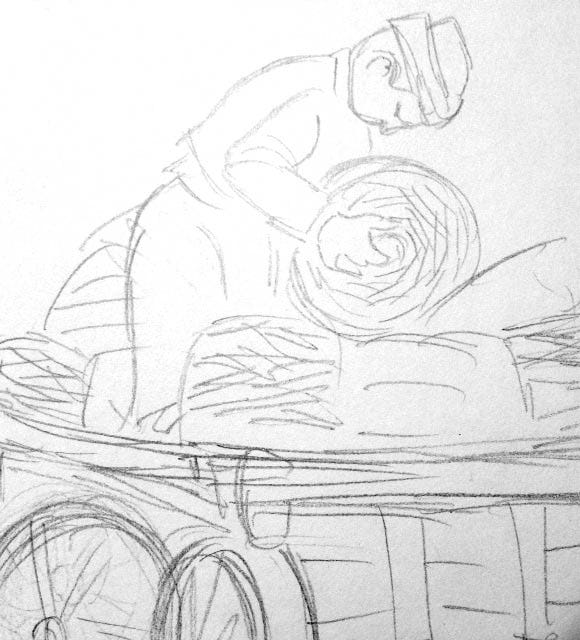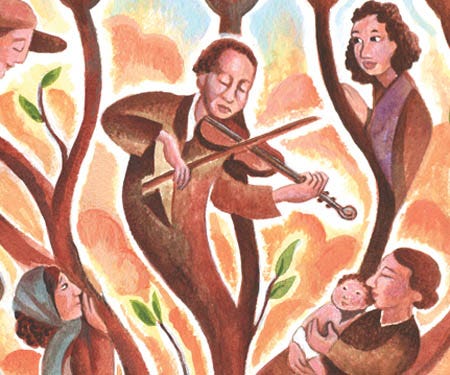Image of the Week: Pioneers in Palestine

© 2019 D. Yael Bernhard
Chalutzim is the Hebrew word for "pioneers" and the title of this painting from my latest calendar, The Jewish Eye 5780/2020 Calendar of Art. I offer a Chanukah image early, because my calendar has just gone on sale (reduced from $18 to $12.95, including shipping), and makes a unique and affordable gift. You can order from my webstore here, or from Amazon here. View the entire calendar here.

This painting called for much internal preparation. I needed to immerse myself in the time and place that inspired the image: Palestine in the 1920s. I'm passionately interested in the young pioneers who strove to establish a nation for the Jewish people in the homeland of their ancestors. As an artist who has done a lot of historical illustration, I find the contrast and connection between ancient and modern fascinating.
These young Jewish idealists from Eastern Europe embraced both physical labor and intellectual pursuits – a combination I've long idealized myself. I could see myself among them, had I lived in that fertile, troubled time. They had fled intractable poverty and vicious anti-Semitism in Europe – choosing to embrace hope instead. They busted social conventions and broke new ground in gender equality. They created a new life from scratch, building cooperative communities. I hungered to learn more about them.
So I borrowed several books full of old photos from my Israeli friend who grew up near Ein Herod, one of the first kibbutzim. These images took me back in time. I did numerous pencil sketches of the chalutzim and their activities. The individuals shown in the painting are all based on real people. From shepherds to pilots, from Yemenite farmers to Russian scientists, I tried to connect with these people by drawing them. (There's also a sketch of Theodor Hertzl on the right, who was not among them, but forged the vision that guided them.)


The result was this painting: a budding tree of life in the form of a menorah that grows out of the land of Israel. The connection of the Jewish people to the land cannot be over-emphasized. Having been denied property rights in Europe, the pioneers of Palestine were happy to roll up their sleeves and work the earth where their ancestors had lived over two thousand years earlier. These 20th century Jews drained swamps, built roads by hand, and tilled the stony earth. They raised children and built a new city by the Mediterranean Sea – Tel Aviv, scarcely a decade old in the 1920s, is now one of the liveliest cities in the world and the source of much of the technology we live by.
Throughout nearly five hundred years of Ottoman rule, Palestine was a neglected, underdeveloped land. When these young pioneers arrived, there was plenty of space for all. Shown in the above/right sketches, from top to bottom, are an Arab village, the fledgling city of Ramat Gan, and the ancient city of Tiberias, which sits on the Kinneret (Sea of Galilee), where the first rabbis gathered during the conquest of the land by the Romans, who named it Palestina.
Two thousand years later, the land became Israel again for the second time. The rest is modern history – unfortunately, a complicated and often twisted one that spins the facts into new forms of anti-Semitism. Having delved into that complex history and walked (and painted) the land, I'm convinced above all that you cannot know or judge Israel without going there – just as you cannot know or judge the United States without ever setting foot here. It would be easy to do so, from a distance, based on what makes the news. The dark side of any nation that shows up in foreign media is far from the whole picture.
I believe the courageous young pioneers who laid the foundation of modern Israel deserve to be honored. I'm doing my best to do that, as an artist living a century later, far across an ocean and a sea.
Who's that violinist in the center of the picture? Check out my calendar and you'll find out!


A good week to all – and if you live in the northeast, stay cozy through the snowstorm.
D Yael Bernhard



